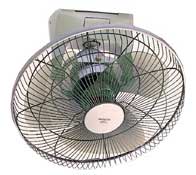Directly blowing air from a fan onto the body can lead to dehydration and loss of heat, causing chills and increasing the risk of illness. When someone is feeling very hot and sweating profusely, suddenly turning on a high-speed fan can easily lead to catching a cold. Even while sleeping, keeping a fan on can result in flu symptoms. The medical field has recorded cases of sudden death associated with sleeping with a fan.
 |
|
(Image: hitachi-hk) |
Some parents report that after using both a mist fan and an electric fan to keep their child cool, the child fell ill. A doctor confirmed that the child had both a sore throat and symptoms of a cold. During these hot days, hospitals have seen a rapid increase in cases of respiratory infections among children, many of which are linked to air conditioning and electric fans.
According to Dr. Quang Binh from the Vietnam-Cuba Hospital in Hanoi, during hot weather, people often set air conditioning to between 18 to 20 degrees Celsius. However, health experts suggest that this practice is not as effective as hoped and may facilitate the growth of bacteria and viruses. The unusual fluctuation between hot and cold air can prevent the body from adapting, making it more susceptible to flu during hot days. Many households have a habit of placing electric fans close to younger individuals and not changing the direction for long periods, causing sweat to evaporate too quickly, resulting in a noticeable drop in skin temperature. In contrast, areas of skin without airflow retain moisture, leading to higher skin temperatures, dilated blood vessels, and an imbalance in blood circulation and sweat secretion. This can result in headaches, dizziness, and overall discomfort, and in severe cases, it can lead to colds or shoulder-neck syndrome that requires medical treatment.
How to Properly Use Air Conditioners and Electric Fans?
Doctors recommend using electric fans primarily to circulate air in the room and reduce heat. When using a fan, one should lie in the direction that the fan blows, facing outwards towards the door. The fan should not be set to high speed; it is advisable to keep the wind speed at 0.2-0.5 meters/second, with a maximum of no more than 3 meters/second. In well-ventilated rooms, a low-speed setting is sufficient for a gentle breeze. Additionally, it is not advisable to direct the fan straight at the body; instead, the airflow should be angled to prevent cold air from directly hitting the body, especially for those who are weak or sweating profusely. Using an oscillating fan is recommended. Elderly individuals, those with health issues, and young children should minimize the use of electric fans. When sweating profusely, it is best not to turn on the fan immediately because the blood vessels in the skin are dilated at that moment; a sudden blast of air can cause them to constrict, hindering sweat secretion and creating an imbalance between heat production and dissipation, leading to excess heat being trapped in the body. Furthermore, when cool air is blown, the local defense mechanisms may weaken, allowing viruses and bacteria to enter, potentially causing respiratory infections, joint pain, or even gastrointestinal issues.
For air conditioning, a temperature difference of 8-10 degrees Celsius between the outdoor and indoor environments is ideal for human adaptation. During the hot season, setting the air conditioning to 26 degrees Celsius can help the body avoid summer illnesses such as nasal congestion, sore throat, headaches, and dizziness. This setting also prevents the body from having to combat both heat and cold, preventing dizziness when moving from an air-conditioned room to the outdoors. It is not advisable to stay in an air-conditioned room for more than two hours at a time. It is important to drink plenty of water to avoid throat dryness and apply moisturizer to prevent skin dryness. Placing a bowl of water in the room and frequently mopping the floor can help maintain humidity. When moving from an air-conditioned room to outside, it is recommended to open the door wide and stand at the doorway for about 2-3 minutes to allow the body to acclimate to the new air.
However, doctors still caution that air conditioning is not suitable for individuals with respiratory conditions, especially asthma patients. Therefore, it is advisable to use natural air by opening windows for proper ventilation between indoor and outdoor air. Air conditioning units should be cleaned monthly or filters replaced monthly as well, as a dirty cooling unit can become a source of disease transmission into the home.


















































